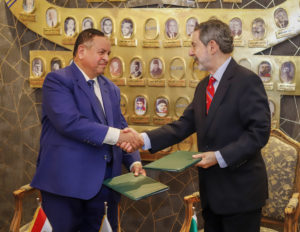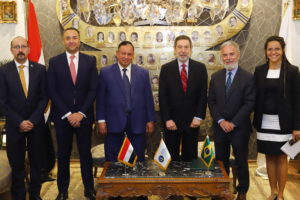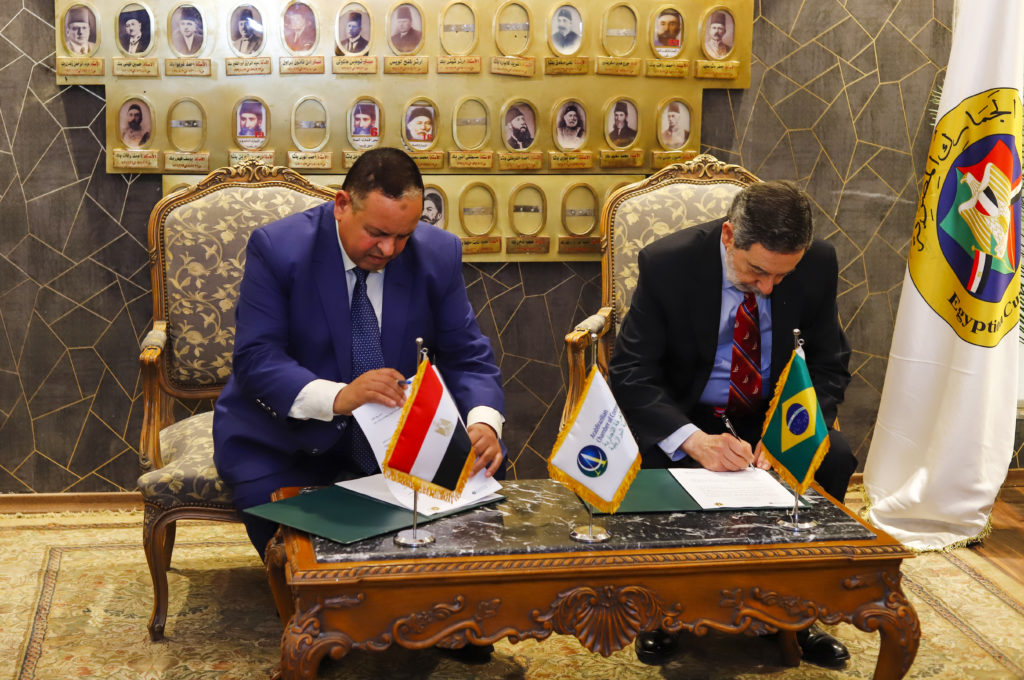Cairo – The Egyptian Customs Authority signed a memorandum of understanding (MoU) to carry out an action plan with the Arab Brazilian Chamber of Commerce (ABCC) towards establishing an electronic connectivity process aimed at digitally exchanging documents and data related to foreign trade shipments with Brazilian customs through the Easy Trade system, developed by the ABCC. The signing occurred this Sunday in Cairo (19) with heads of both institutions and authorities.
The head of the Egyptian Customs Authority, Al-Shahat Ghaturi, stated the plan aims to support and facilitate trade between Egypt and Brazil, increase commercial exchange, achieve economic development targets, and seize more significant benefits from the free trade agreement signed between Egypt and Mercosur in 2010, which entered into force in September 2017.
Ghaturi explained the entity seeks to take advantage of the ABCC’s expertise in electronic connectivity operations with the Brazilian customs to exchange documents and data and guarantee their security. According to him, the signed MoU includes an action plan and a solid roadmap for assessing the system and carrying out training by ABCC technical staff to reach a final agreement and start the implementation.
The head of the Egyptian Customs Authority said the organization aims to facilitate trade with all countries, particularly Brazil, due to close trade and economic ties between the two nations. Egypt imports several products from Brazil, including animal protein, maize, soybeans, and sugar. The Arab country also exports some products to the Brazilian market, such as chemicals, agricultural inputs, fertilizers, and processed foods.

He emphasized the Egyptian government has carried out economic reforms in recent years in all sectors, including customs, through legislative amendments and automation of customs procedures. Ghaturi thanked the initiative suggested by the ABCC to implement electronic connectivity, which helps in clean trade, preserving public assets and the rights of both countries, and speeding the clearance of goods, in line with the growth of the Egypt-Brazil trade.
He suggested the formation of a team of technicians and specialists from the Egyptian Customs Authority to study the electronic connectivity system made available by the ABCC and carry out training, in addition to assessing the ABCC’s experience with the Jordanian Customs, to position on strengths and weaknesses and reach consensus on the final version of the agreement.
The ABCC already has an agreement with Jordan in force, and exports from Brazil to the Jordanian market can now be made through the digital process. The Easy Trade system uses blockchain technology and is part of a larger foreign trade platform of the ABCC, Ellos, which aims to move all stages of exports to digital, from trade promotion to financing.
Brazil’s president-elect
The Brazilian ambassador to Cairo, Antonio Patriota, participated in the signing event and congratulated the Egyptian government and Customs Authority for the outstanding organization of the United Nations Conference on Climate Change (UNFCCC COP 27), held in Sharm El-Sheikh, which with the participation of international delegations. COP27 received a sizeable Brazilian group, including president-elect Luiz Inácio Lula da Silva, who had a great reception from the Egyptian government.
Brazil’s president-elect invited Egyptian president Abdel Fattah El-Sisi to visit Brazil next year. He also invited the head of the Egyptian Customs Authority to meet with Brazilian customs authorities to discuss means of boosting bilateral trade and facilitating procedures between the two countries.
Easy Trade System
Ambassador Osmar Chohfi, president of the ABCC, said Egypt is one of Brazil’s most important trade partners in Africa and the Arab world since the volume of bilateral trade last year came close to the figure of USD 2.5 billion, confirming the importance of facilitating trade movement to double that number.

He highlighted the ABCC seeks to implement electronic connectivity for the exchange of data and information between Brazil and all the Arab countries, recalling the signing of the MoU makes Egypt the second Arab country to take concrete measures towards implementing the system, following the agreement signed with Jordan, which has already entered into force.
Chohfi highlighted the MoU as a milestone for greater cooperation between the ABCC and Egyptian Customs, meeting the interests of both countries, and explaining the system was designed based on an artificial intelligence system to verify the authenticity of documents issued in Brazil, thus ruling out the need for paperwork in the future.
The ABCC president said one of the system’s advantages is the reduction of fraud, import costs, and time in customs clearance of shipments since there is no need to wait for paper documents to arrive.
Guarantee of authenticity
The secretary-general & CEO of the ABCC, Tamer Mansour, said: “We are pleased to cooperate with the Egyptian Customs in this preparation phase for the implementation of the full electronic connectivity system between the customs authorities of Egypt and Brazil.” He also said the Brazilian entity is the only one that has signed electronic connectivity agreements with Arab countries. Mansour committed to ensuring the authenticity of all documents issued through the new system to protect the security and authenticity of shipments to Egypt.
Translated by Saleh Hassan & Elúsio Brasileiro




